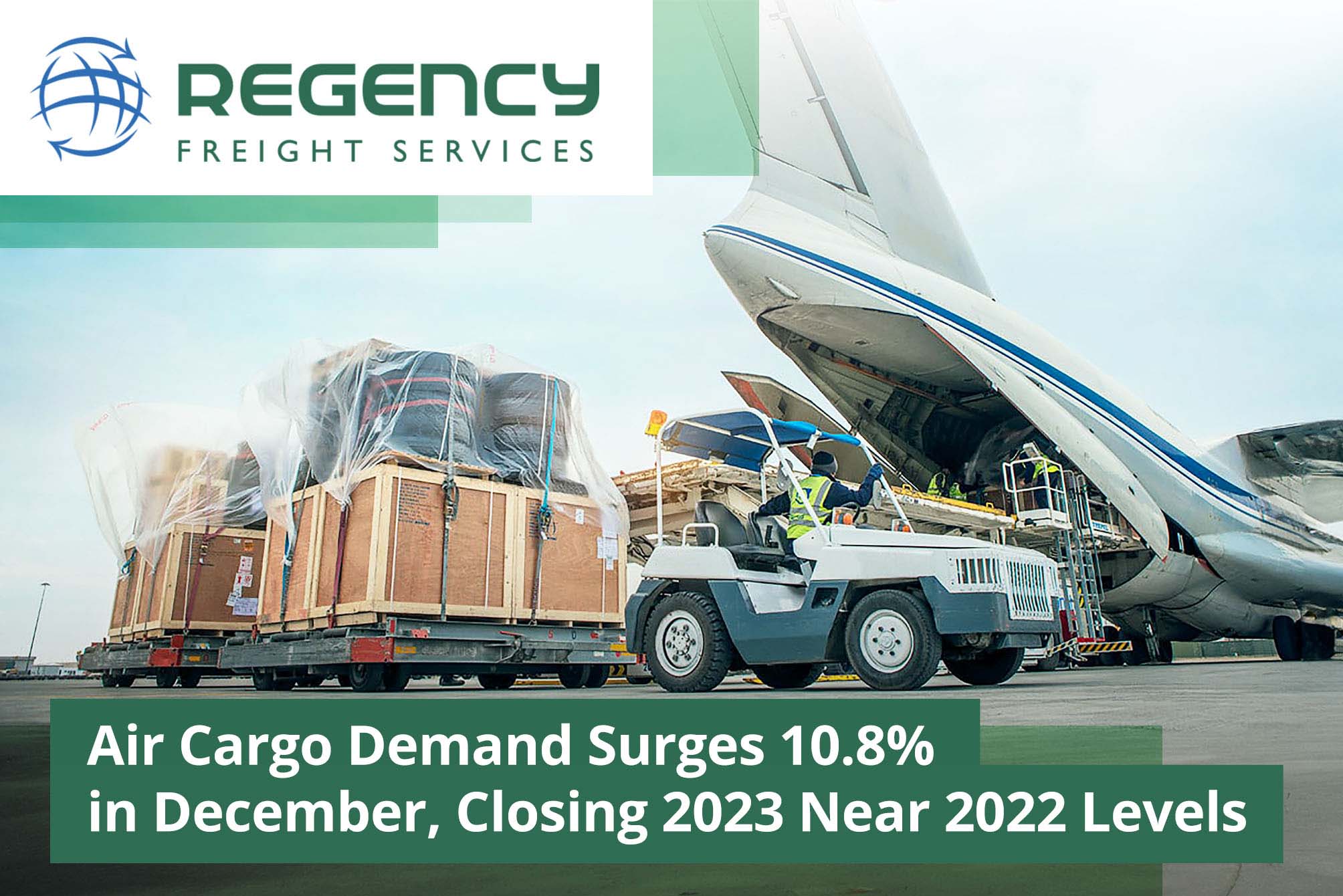Air Cargo Demand Surges 10.8% in December, Closing 2023 Near 2022 Levels1 Comment1 March 2024
The International Air Transport Association (IATA) released data for global air freight markets showing that air cargo demand rebounded in 2023 with a particularly strong fourth quarter performance despite economic uncertainties. Full-year demand reached a level just slightly below 2022 and 2019. Global full-year demand in 2023, measured in cargo tonne-kilometers (CTKs), was down 1.9% compared to 2022 (-2.2% for international operations). Compared to 2019, it was down 3.6% (-3.8 for international operations). Capacity in 2023, measured in available cargo tonne-kilometers (ACTKs), was 11.3% above 2022 (+9.6% for international operations). Compared to 2019 (pre-COVID) levels, capacity was up 2.5% (0.0% for international operations). December 2023 saw an exceptionally strong performance: global demand was 10.8% above 2022 levels (+11.5% for international operations). This was the strongest annual growth performance over the past two years. Global capacity was 13.6% above 2022 levels (+14.1% for international operations). Some indicators to note include: Global cross-border trade recorded growth for the third consecutive month in October, reversing its previous downward trend. December Regional Performance (Total Market) North American carriers reported the worst year-on-year performance of all regions, with a 5.7% decrease in demand in 2023 compared to 2022 (-4.3% for international operations) and a capacity increase of 0.3% (+2.7% for international operations). In December airlines in the region reported a 2.0% increase in demand (+5.9% international operations), compared to 2022. Capacity increased 2.4% (+8.5% for international operations) during the same period. European carriers posted a 3.9% decrease in demand in 2023 compared to 2022 (-4.1% for international operations). During the same period, airlines posted a capacity increase of 4.5% for both global and international operations. In December, airlines in the region posted an 8.6% increase in demand (+8.7% for international operations) compared to 2022. Capacity increased 7.4% (+7.5% for international operations) during the same period. Airlines in the region continued to be most affected by the war in Ukraine. Middle Eastern carriers reported an increase in demand of 1.6% for global and international demand in 2023 compared to 2022 and an increase in capacity of 13.5% (+13.6% for international operations). In December airlines in the region posted an 18.3% increase in demand for both global and international operations compared to 2022. Capacity increased 17.7% (+17.8% for international operations) during the same period. Latin American carriers posted the strongest year-on-year performance of all regions, with a 2.0% increase in demand in 2023 compared to 2022 (+1.9% for international operations). During the same period, airlines posted a capacity increase of 13.2% (+16.9% for international operations). In December airlines in the region posted growth in demand of 6.4% (+6.3% for international operations) compared to 2021. Capacity grew 3.5% (+4.2% for international operations) during the same period. African airlines reported a decrease in demand of 1.8% (-2.0% for international demand) in 2023 compared to 2022 and an increase in capacity of 5.6% (+5.0% for international operations). In December airlines in the region posted the weakest performance of all with a 1.2% decrease in demand (-1.4% for international operations) compared to 2021. Capacity grew 7.4% (+6.8% for international operations) during the same period. Red Sea Disruption A 1% increase in global air cargo demand coupled with a 5% rise in yields; "The recent disruption to maritime routes in the Red Sea has seen some shippers pivot to air cargo. The increased demand saw a spike in air cargo yields on related trade lanes. A similar spike is expected in January as disruptions intensified. While not all cargo is suitable for air transport, it is a vital option for some of the most urgent shipments in extraordinary circumstances. And that is critical to the continuity of the global economy, said Walsh. Source: IATA |
|
   |

